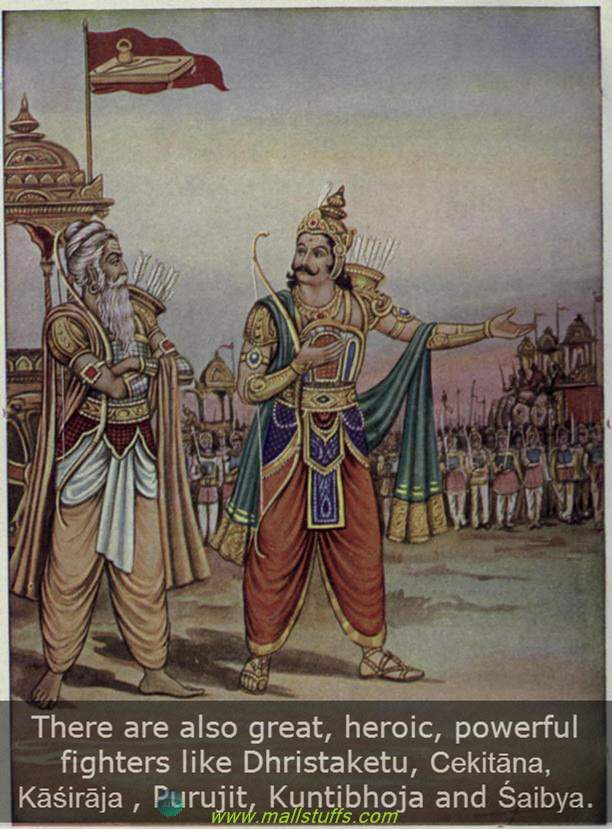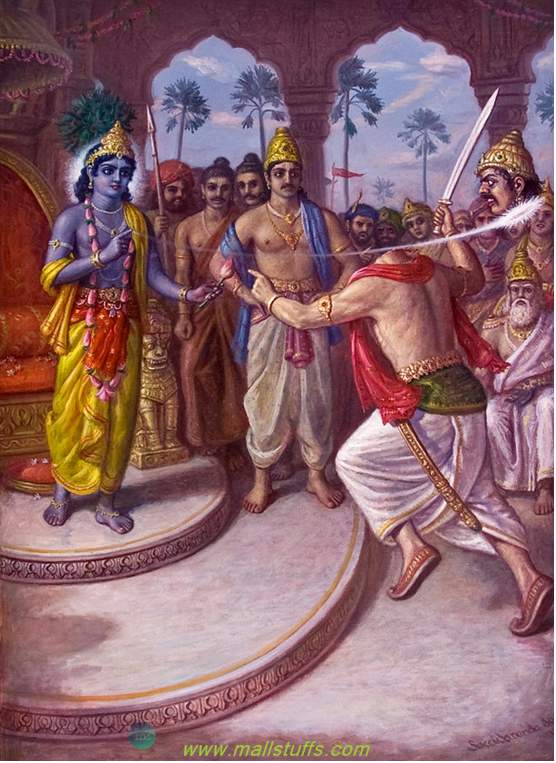
Bhagavad gita Chapter 1,verse 5 english and hindi poetic translation with lessons
In the fourth verse of chapter 1, we saw how Duryodhana listed out the names of those warriors who were loyal to Dronacharya but later betrayed him and his teachings for selfish materialistic desires. Keeping on the previous verse, duryodhana continues to list out the names of some more powerful Pandava warriors who had cheated Dronacharya and Kaurava kingdom by forming a pact with the enemies.
Original Sanskrit verse
धृष्टकेतुश्चेकितानः काशिराजश्च वीर्यवान्।
पुरुजित्कुन्तिभोजश्च शैब्यश्च नरपुङ्गवः॥१-५॥
English Transliteration:
dhrishtaketushchekitaanah kaashirajascha veeryavan |
purujitkuntibhojashcha shaibyascha narapungvaha || 5 ||
English Translation:
There are also great, heroic, powerful fighters like Dhròsòtòaketu, Cekitâna, K āśirâja, Purujit, Kuntibhoja and Œaibya.
Word to word translation
dhrishtaketu: Dhrishtaketu(Name of warrior)
chekitaanaha: Chekitaana(Name of warrior)
kaashiraajaha: King of Kashi
veeryavan : Very powerful
purujitaha: winner of many battles
kuntibhoja: Kuntibhoja(Name of warrior)
shaibya: Shaibya(Name of warrior)
narapungvaha- Warriors who fight for social evils
<>
My Hindi poetic translation
और भी है कई सरे योद्धा
सभी अत्यंत शक्तिशाली और बलवान
जैसे की ध्रिस्टकेतु, पुरूजित और सैब्या
जिन्हे करती है मानव समाज कोटी कोटी प्रनाम
My English poetic translation
There are many other warriors too
All of them powerful and mighty
Dhròsòtòaketu, Purujit, & Œaibya to name a few
Well-known as noble heroes of human society

Lessons/message from this verse
This verse is very similar of the previous verse that glorifies some of the skilled valiant warriors of the pandava army. Since both the verses are quite similar, learning’s from the verses would also be quite similar. Therefore, all the morals of the previous verse are also applicable to this verse. Let us revise the morals we learnt in the previous verse. They are as follows:
1) Praise enemy intelligence and heroic skills to coerce the warriors in your army burn in rage and revenge.
2) Praise the enemy to ensure your army doesn’t underestimate the enemy prowess
3) Even the strongest seek refuge of the powerful experienced warriors
4) Choose the name of your enemies carefully to invite strong response from your fighters
5) Never believe your close relatives and best friends blindly as they may cheat against you for supremacy and monetary benefits
For the detailed explanation of above morals along with its applicability to software industry, go through this link
There are few additional lessons to learn from this verse. To comprehend these lessons more precisely, let us have a brief summary of all the warriors named in this verse.
Drstaketu - He was the King of the Cedis. His father ‘Sisupala’ was killed by lord Krishna. After the funeral ceremony of ‘Sisupala’, lord Krishna anointed Drstaketu as the king of Cedis kingdom

Lord Krishna beheading Sisupala
Cekitana - Cekitana was a Yadava prince and commander in chief of Aksauhini forces. Chekitan is a caste of vibrant ‘Jat’ community today.
Kasiraja - King of Kasi and paternal uncle of pandavas, he was a gallant maharathi who defeated many warriors of Kauravas kingdom
Kuntibhoja - Kuntibhoja was a Yadava prince who adopted Queen Kunti. Queen kunti was the daughter of king Shurasena and mother of the pandavas.
Purujit - Brother of Kunti, he was the ruler of Kuntibhoj (an ancient kingdom located in modern Madhya Pradesh) and maternal uncle of the Pandavas. He participated in this war along with his powerful sons.
Saibya - He was a very generous and behavioral king of Sibis Kingdom. His daughter ‘Devika’ was married to prince Yudhisthira, eldest of the pandavas.
In this verse, Dhristiketu, Cekitana and Kasi are extolled as viryavan, meaning “very powerful”. King Saibya has been praised as ‘narapungava’, meaning “noblest of all men”.
Try and try again to convince your commander to fight on your side
In the previous verse, duryodhana listed out the names of those warriors who have betrayed Guru Dronacharya in his terrible life mixed with extreme sorrow and sufferings. He praised all such warriors of Pandavas army to provoke feeling of hatred and revenge in Dronacharya mind but Dronacharya controlled his sentiments and emotions. Seeing no strong response from Guru Dronacharya, he continued on his task of provocation by listing out the names of more warriors who were a serious threat to kauravas kingdom. He kept on praising their qualities to induce jealously and hatred in Dronacharya mind so that he fights the war seriously without failing down to any personal attachments or emotions.
How this point is applicable to software industry (One example)
This scenario is usually faced by HR and project manager in the case where the employee resigns from the company to join their rival company. Both of them convince the resignee to stay in the company by offering him more perks and incentives. To counterstrike the employee thinking of joining the rival company, they would first praise the qualities of rival company and then would divert his attention to the negative aspects of rival company and the extra benefits that has been offered to him by his present company.

Always keep yourself focused on your objective
Though Duryodhana kept praising the qualities of Pandavas warriors, he was very focused on his objective. He kept on naming only those warriors that would turn perilous and has the capability of causing great havoc and destruction to the Kauravas army. One arrow of such warriors would kill thousands of Kaurava soldiers at the same time. So, his intention was not to exalt the Pandava warriors but to compel dronacharya to kill all the Pandavas warriors named in this verse and previous verses so that their thousands of soldiers are saved from the life-taking arrows of such warriors. He wanted dronacharya to keep a special eye on all named warriors and seek every opportunity to kill them.
How this point is applicable to software industry (One example)
Here is a very important lesson to those who frequently participates in group discussions and management meetings. Group discussion and meetings are a very expedient platform to demonstrate your talent, communication, analytical and management skills. In such cases, inferior or juniors should seek every opportunity to counter-attack the views of superiors by presenting your own solutions to the problems effectively and precisely. Counter-attack in this sense does not mean you should condemn the views of the superiors. By counter-attack, I mean you should first appreciate the views presented by the superior and should then refute their views by suggesting few solutions that would handle the situation more easily and proficiently.

Make sure you do not behave like anyone of this
You should always keep your mind focused on finding the issues in your superior’s perspective and presenting a more viable solution. This would attract the attention of the senior management and would help considerably in appraisals and promotions.
Conclusion:
In this article, we saw the various spiritual messages and vital philosophical lessons in chapter 1, verse 5 of bhagavad gita. In next article, I will write on various lessons and several spiritual messages from chapter 1, verse 6 of bhagavad gita
Note: Images used on this website
are either a production of Bhaktivedanta Book Trust(https://www.krishna.com), Iskcon
Foundation or were found in google search under "Free to use and share". If any
of the images presented here violates copyright issues or infringes anyone copyright
or are not under "Fair use", then please bring it to our notice. Read
Disclaimer for more.
Share this to your friends. One of your friend is
waiting for your share.
Related Articles
Why Hindus offer food to god
Should software professionals practice spirituality
What Happens To Us After Death
Bhagavad gita quote against caste system
Science in Hinduism-Big bang,Creation & destruction of universe
Hindu mantras for wealth and abundance
Visit to isckon temple
Was hinduism ancestral religion of Europe
Bhagavad gita Chapter 1,verse 5 english and hindi poetic translation with lessons
Who invented snakes and ladders
Post Comment